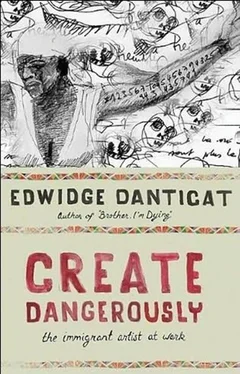How does one write under those conditions? this novel asks again and again. How can we not write in code, andaki , when so many of those who came before us lost their lives because they thought they had nothing to fear? How does Jan J. write after having seen her father gunned down a few feet from where they worked together at his radio station? The book that she finally began writing three years after his death is called Mémoire errante , Wandering Memory.
In Mémoire errante , Jan J., now as a memoirist, writes, “Since April 3, 2000, I no longer write. Before I was full of ideas. I have always loved working on many texts at once, planning parallel stories. A story set in the present filled with furor and noise while dreaming of a woman from the past without knowing if the two will eventually become linked. There has been no link. There has been no book.”
A book that almost never was is Amour, colère, folie , the singlevolume trilogy I encountered on my next trip to my Livres Haitiens haven at the Brooklyn public library. The author was the stunning and brave-the guapa -Marie Vieux-Chauvet. Born in Port-au-Prince during the first year of the U.S. occupation, she would later recreate this period in Love , the first novella in her seminal trilogy, which was published for the first time in English in August 2009 as Love, Anger, Madness . Claire Clamont, the main character of Love , equates her own unfortunate predicament as a thirty-nine-year-old virgin with the predicaments of D. H. Lawrence’s Lady Chatterley and Flaubert’s Madame Bovary (both Vieux-Chauvet favorites) when she laments in her journal that “there is hunger of the body and that of the soul. And the hunger of the mind and the hunger of the senses. All sufferings are equal.”
But is all suffering equal, Marie Vieux-Chauvet wonders, when the people who suffer are not considered equal? How do those who stuff hot potatoes into their child servants’ mouths fare against those who murder a journalist or rape a neighbor? How can those who have been brutally enslaved turn around and enslave others? Is suffering truly equal when we live in a society that would never allow the people who are suffering to be considered equal?
“We have been practicing at cutting each other’s throats since Independence,” Vieux-Chauvet writes of the country that we Haitians like to remind the world was the first black republic in the Western Hemisphere, home to the only slave revolt that succeeded in producing a nation. What we would rather not say, and what Vieux-Chauvet does, is that this same country has continued to fail to reach its full potential, in part because of foreign interference, but also because of internal strife and cruelty.
X, the pseudonymous town featured in Love , is terrorized by local henchmen who are given by an unseen dictator the power to decide at any time who lives and who dies. The town is also plagued by other terrors. Not only are the hills and mountains heartbreakingly eroded, but American ships routinely leave X’s ports filled with prized wood from trees the loss of which is causing that erosion. Children die of typhoid and malaria. Beggars drink dirty water from ditches and are routinely persecuted by the ruling colonel. Even though this section of the trilogy is mostly set in the 1930s, it is obvious that it is meant also to evoke the later period, 1967, during which this book was written in a six-month-long writing binge-when the elder Duvalier’s regime was becoming more and more severe and, in addition to carrying out public and private executions, was persecuting intellectuals and artists.
“Alone again,” Marie Vieux-Chauvet writes, referring to Rose Normil of Anger , the second novella in the trilogy, “she had invented touchingly naïve myths to console herself: a leaf whirling in the wind, a butterfly whether black or multicolored, the hooting of an owl or the graceful song of a nightingale seemed pregnant with meaning.”
This is me, I thought, reading this while attempting my first little stories filled with my self-created folklore-my fake-lore-my hybrid and métisse warm-weather daffodils, my crackling fires of dried tree branches and death-announcing black butterflies, my visions of flame-feathered birds.
It is in Madness , the final novella of the trilogy, that Vieux-Chauvet perhaps comes closest to reproducing herself and her dilemma as a writer living and writing under a brutal authoritarian regime. Depicting four persecuted poets living in a shack, she echoes her own membership in Les Araignées du soir (Spiders of the Night), a small group of poets and novelists who met weekly at her house to discuss one another’s work. Like actual spiders, they hoped to weave a protective web around their own and keep out predatory pests. But many were either jailed or exiled by the dictatorship, and Marie Vieux-Chauvet herself had no choice but to flee Haiti in 1968, after this book, on the verge of being published in Paris, was pulled from publication for fear that her family members might be arrested or killed.
According to Rose-Myriam Réjouis, one of the trilogy’s two official translators, when Marie Vieux-Chauvet received news that the book had been accepted for publication, she threw a party at which she read excerpts from her manuscript to her friends and family.
“It was then,” writes Réjouis, “that family and friends expressed concerns about how the book might, no matter what absurd formula Duvalier used to determine who counted as an enemy of the state, put the life of every member of her family and her husband’s family at risk.”
At first Marie Vieux-Chauvet resisted, insisting that the publication of the book might bring rebuke and shame to the regime, but then it became obvious that she would have to choose between the book and the people she loved.
“There is a curious split in my behavior,” the poet narrator of Madness confesses. “I calmly go where there is screaming, where I am certain the devils are committing murder. I avoid danger while accusing myself of cowardice, loathing my own reactions. In the trunk there are a few poems, unpublished, as are all of my poems about devils and hell. Enough of them there to get me pumped full of lead without anyone hesitating.”
Exile became Marie Vieux-Chauvet’s only choice.
Later, while living in Queens, New York, Marie Vieux-Chauvet wrote Les Rapaces (The Vultures), a novel that portrays a writer wrestling with his work and his brutal surroundings after the death of Papa Doc Duvalier. Through the valiant effort of a devoted reader, the work of that book’s fictional writer manages to live on, something that Marie Vieux-Chauvet must have dreamed of for herself while writing about Haiti, in French, in the United States, not certain if either she or her books would ever find their way back to Haiti or would ever find an interested audience in the United States.
On June 19, 1973, at fifty-seven years old, Marie Vieux-Chauvet died of brain cancer after five years in exile. The Duvalier dictatorship had been passed down from father to son, whom the U.S. government saw as more acceptable. Foreign investment flowed into Haiti, nurturing an atrocious sweatshop culture that added another layer of despair to the lives of a population that could not refuse to work, no matter how meager the pay. Other poor Haitians were sold by the Haitian government in secret deals to work in the sugarcane fields of the Dominican Republic and were shipped off like slaves to the other side of the island.
As a child growing up in Haiti at the time, I heard, along with the darkest of tales of the brutal Tonton Macoutes or Vieux-Chauvet’s men in black, stories of children being kidnapped so their organs could be harvested and used to save rich sick children in America, an idea that frightened me so much that I sometimes could not sleep. What would Marie Vieux-Chauvet have made of such a tale? I wonder. Or of the period that followed the end of the Duvalier dictatorship, when the son flew off into his own exile and the people, like the beggars of her trilogy and the masses of Les Rapaces , took to the streets in celebration and revenge? What would she have made of the first democratically elected president of Haiti, or the death of Jean Dominique? Of September 11th? Of Haiti’s catastrophic earthquake on January 12, 2010? And what would it have been like to have sat down with her over a cup of coffee in a dark corner of a Haitian restaurant in Port-au-Prince or Miami, as I have had the pleasure of doing with Jan J. Dominique? In Marie Vieux-Chauvet’s absence, I feel orphaned. But it was only after I read Jan J.’s Mémoire errante that I felt once again what it was like to lose a literary parent and a biological one at the same time.
Читать дальше












